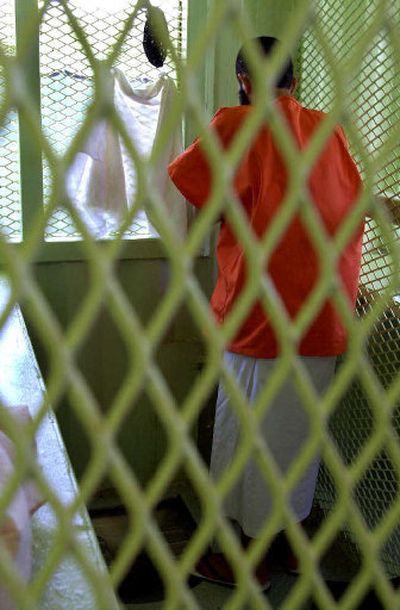Pentagon bars torture evidence

MIAMI – Just days ahead of a Supreme Court showdown, the Bush administration has decided to forbid any evidence at the Guantanamo war crimes court that was obtained through torture.
Military defense attorneys and other critics argue that the so-called military commissions do not meet basic American standards and have repeatedly pointed to Pentagon rules that permit hearsay evidence, which could be a conduit for confessions extracted through torture.
Pentagon officials say the instructions being prepared should have no impact on the war-on-terror trials because they say torture has not occurred at Guantanamo.
But torture became an issue at a commission hearing March 1 when Army Col. Peter Brownback, a presiding officer, mused aloud about the meaning of the word, and then offered a definition: “poking a person in the eye with a red-hot needle.”
Later, Air Force Maj. Jane Boomer, a Pentagon spokeswoman, said a war crimes court could consider such evidence because, unlike in standard U.S. civilian and military courts, there was no rule excluding it.
Moreover, a lawyer for Guantanamo captive Binyam Mohammed, 27, is claiming in a brief filed at the Supreme Court that his client was tortured into confessing al-Qaida links after he was sent to Morocco for interrogation.
British-American attorney Clive Stafford Smith’s brief gives graphic and gruesome details, including an interrogator allegedly slicing Mohammed’s genitals with a scalpel.
Mohammed, an Ethiopian exile who received asylum in London, is slated to make his first commissions appearance next month at Guantanamo, where he is accused of being an al-Qaida co-conspirator.
Wednesday, a Pentagon spokeswoman said the Defense Department General Counsel’s office is writing a military commissions instruction that flat-out forbids evidence gained through torture.
No timetable has been set for its release, said the spokeswoman, who spoke on condition she not be identified.
A total of 10 captives among nearly 500 at the U.S. Navy base in Cuba face trial by the commissions, which President Bush authorized by executive order in November 2001.
Commissions’ legality to be argued
The Supreme Court hears oral arguments Tuesday on whether the commissions are constitutional – and whether Guantanamo captives facing a commission can appeal their captivity to a civilian court in advance of a military verdict.
Defense Department spokesman Bryan Whitman said Wednesday that Pentagon officials had earlier been disinclined to issue such a ruling because it “to some degree would erroneously suggest that torture had actually occurred.”
The reason to introduce it now, he said, would be to “eliminate any doubt in people’s mind that the Convention Against Torture, specifically Article 15, is applicable to these commissions at Guantanamo.”
U.S. officials concede that abuses have occurred at Guantanamo, but say aggressive coercive tactics are not torture.
Investigations have found that American guards and interrogators stripped naked a so-called high-value detainee there, left him to defecate and urinate on himself, blasted him with loud music, dressed him in a bra and had him perform dog tricks – in order to extract a confession.
That captive’s lawyer said he has since recanted.
The Pentagon instruction would be the latest change to an evolving rulebook on how the United States intends to stage the first exclusively American war-crimes trials since World War II.
An earlier draft allowed the military to eavesdrop on detainee conversations with their American military lawyers, a rule that stirred widespread condemnation as a violation of the U.S. principle of attorney-client privilege.